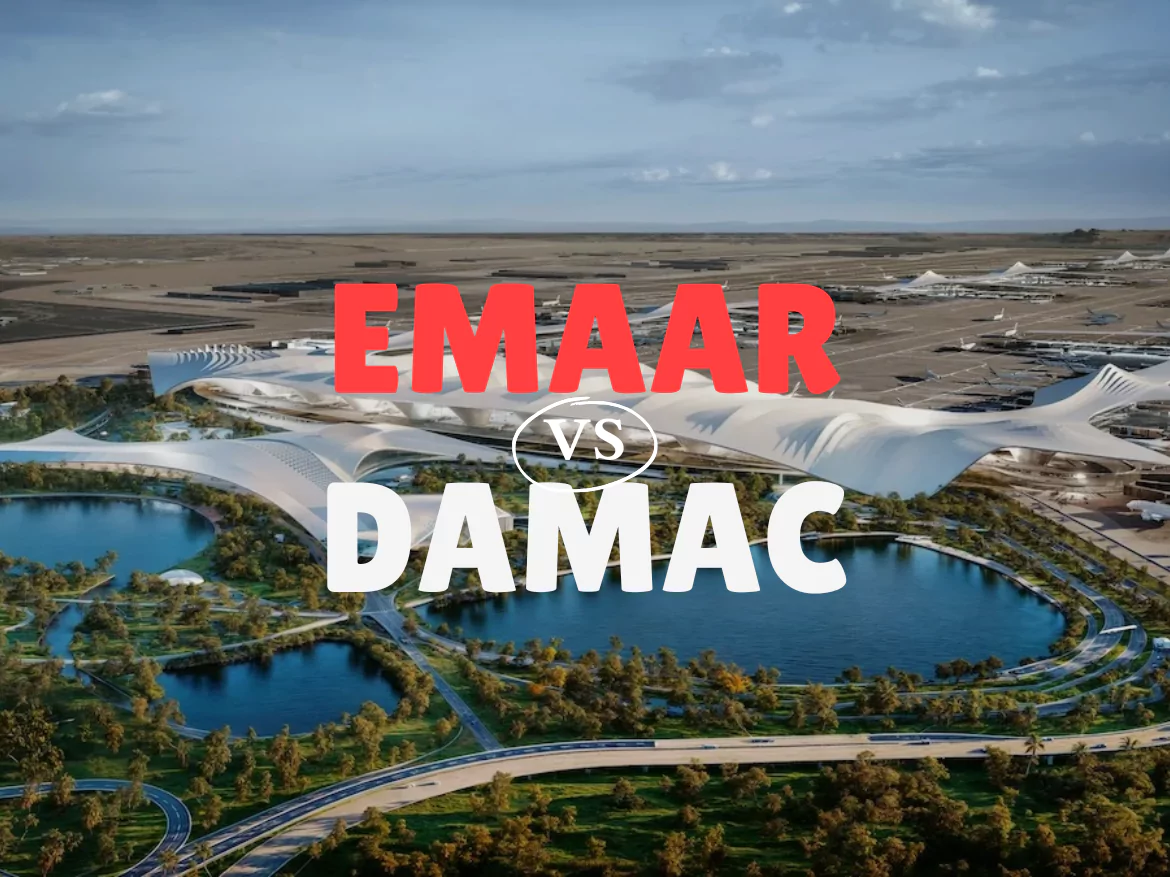Hey, we’re more thrilled about this blog, as it is our first Emaar vs. DAMAC Comparison. Let’s dive into the location, investment, and potential returns of these two developers.
Location and Investment
Emaar’s Investment
Emaar’s new project is situated in a prime location with significant investments. The government has invested around $80 billion in infrastructure, making it a highly valuable area. This includes:
- Heights and Oasis: Key communities within this development.
- Infrastructure Projects: Such as the expansion of Sheikh Zayed Road, Emirates Road, and the development of new metro lines.
DAMAC’s Investment
DAMAC’s new project, Riverside, is also strategically located. It benefits from similar infrastructure investments and proximity to major landmarks.
- Riverside by DAMAC: Located in an area with heavy government investment.
- Key Developments: Including the new airport and logistics hubs, which will enhance connectivity and appeal.
Master Plans Comparison
Emaar’s Heights
Emaar’s Heights offers:
- Increased Plot Sizes: Designed to cater to the demographic shift towards larger homes.
- Flexible Floor Plans: Open kitchens that can be closed off, catering to both South Asian and Western preferences.
- Twin Villas: A popular product with a history of success.
DAMAC’s Riverside
DAMAC’s Riverside includes:
- Initial Master Plan: Similar to DAMAC Lagoons with varied clusters.
- Innovative Layouts: Though some layouts, like long gardens and lack of maid’s rooms, may pose challenges.
- Attractive Pricing: Competitive prices per square foot, offering good value for investors.
Investment Strategy and Returns
Emaar’s Payment Plans and ROI
Emaar offers an 80/20 payment plan, appealing to buyers with holding capacity. Investors benefit from:
- Priority in Booking: Ensuring access to the best clusters.
- Minimal Risk: Emaar’s strong brand and historical performance minimize the risk of loss.
- Potential Returns: Conservative estimates suggest around 45% ROI by 2027.
DAMAC’s Payment Plans and ROI
DAMAC’s 1% monthly payment plan can be attractive but requires careful consideration of cash flow jumps. Investors should:
- Understand Cash Flow: Anticipate the 32% payment within the first 12 months.
- Evaluate Product Demand: Focus on in-demand products like 5-bedroom units.
- Potential Returns: Similar conservative estimates for DAMAC’s projects.
Conclusion
Both Emaar and DAMAC offer exciting opportunities in Dubai’s real estate market. The key is to understand the location, infrastructure investment, and product demand. Emaar’s strong brand and historical performance provide a safer investment, while DAMAC’s competitive pricing and innovative layouts offer potential high returns.
Investment Tips:
- Choose the Right Product: Focus on clusters and high-demand properties.
- Understand Payment Plans: Ensure cash flow aligns with the payment schedule.
- Leverage Government Investments: Invest in areas with significant infrastructure development.
By carefully analyzing these factors, investors can maximize returns and make informed decisions in Dubai’s dynamic real estate market.
FAQs – Emaar vs. DAMAC Comparison
- Which developer offers better investment returns, Emaar or DAMAC?
Both Emaar and DAMAC offer competitive returns, but Emaar’s strong brand and historical performance provide a safer investment. - What are the key infrastructure projects supporting these developments?
Key projects include the expansion of Sheikh Zayed Road, Emirates Road, new metro lines, and the development of new airports and logistics hubs. - How do the payment plans of Emaar and DAMAC differ?
Emaar offers an 80/20 payment plan, while DAMAC offers a 1% monthly payment plan with significant initial payments. - What are the unique features of Emaar’s Heights and DAMAC’s Riverside?
Emaar’s Heights features larger plots and flexible floor plans, while DAMAC’s Riverside includes innovative layouts and attractive pricing. - Which areas are considered prime locations for these developments?
Both developments are located in areas with substantial government investments in infrastructure, making them prime locations.




